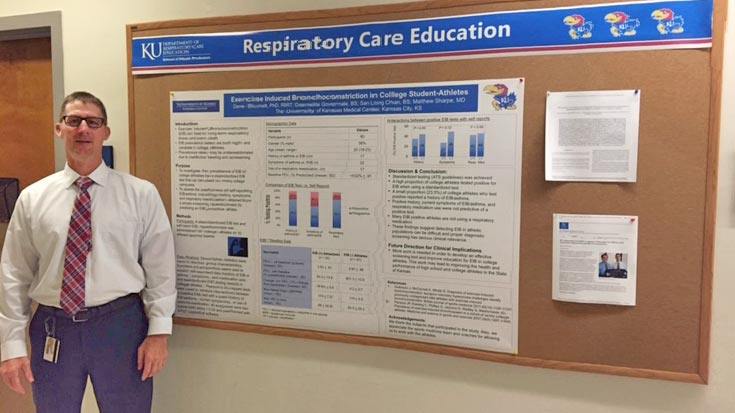
We continue our “Open Forum Series” in this issue with an interview with Dave Burnett, PhD, RRT, AE-C, from the University of Kansas Medical Center in Topeka, KS. Dr. Burnett presented the Editors’ Choice abstract on “Screening of Exercised Induced Bronchoconstriction in College Student-Athletes” at AARC Congress 2015 in Tampa, FL.
Why did you decide to study exercised induced bronchoconstriction in college athletes? What piqued your interest in this topic?
Exercise induced bronchoconstriction (EIB) is frequently misdiagnosed in the clinical environment. College student-athletes are a population that has shown to have high prevalence rates, but few college campuses have accurate EIB screening programs.
Was this your first time conducting a research study? If not how many other studies have you conducted and where have you presented them or had them published?
No, I’ve either been a primary investigator or co-investigator on other studies involving asthma, pulmonary rehabilitation, breast cancer survivorship, and delayed onset muscle soreness in runners. Presentations on these studies have been made at state and national meetings, including those sponsored by the AARC and the American College of Sports Medicine. Also, the work has been published in peer-reviewed journals focusing on exercise in special populations, women’s health, and respiratory care.
How difficult was it to gain support from your organization to conduct the study?
The organization I work at supports faculty with a strong research agenda aimed at improving the health of communities.
What were the biggest challenges you faced as you carried out the study and how did you overcome them?
The biggest challenges to conducting the EIB studies included organizing all the study team members. This entailed enlisting and training the team members who would help complete the study. Next, I had to be able to recruit the participants for the study. Lastly, finding the time needed to complete the rigorous work required for the scientific aspects of the study posed a challenge.
How difficult was it to work the study into your normal job responsibilities and how did you alter your work routine to make it happen? Do you think it was worth the time and effort?
Conducting research usually means performing additional work beyond the normal work schedule. You simply just need to add additional time to the weekly routine. But I feel it’s definitely worth the extra work. Plus, my career track requires that I have a research agenda, complete work, and publish.
How did it feel to learn that your abstract had been accepted to the Open Forum — and most especially, that it was selected for the prestigious Editors’ Choice session?
I was honored to receive notice the abstract was selected for the Editors’ Choice session. In addition, I was excited to have the opportunity to learn from colleagues while presenting at the Open Forum.
How do you think conducting a study like this and having it accepted to the Open Forum is helping to further your career in respiratory care?
There are so many talented RTs in our profession in several niches of our trade. I just happen to be passionate about seeing RTs get recognized in the scientific community through the work they publish. As a result, we become more credible as a health care profession.
What advice do you have for other therapists who might like to follow in your footsteps but just don’t know how to get started?
Be patient, always persevere, and stay positive. This is what I tell all those who pursue the education journey that leads to acquiring the skill set for performing the all-encompassing aspects of research. This path is not for everyone, but if you decide to go the scientific route, then do it by going all in.
What will you study next and why?
We are continuing to study EIB in different populations. Also, we’re adding a nutritional and basic science component to our previous EIB work. I’m helping our faculty develop research projects in telehealth, COPD in-home rehabilitation, and even patient assessment through art interpretation as well. I just mentor the faculty and they serve as the primary investigator who collaborates with other health professions on our campus. A really cool opportunity just presented itself too — possible research collaboration between other respiratory care education institutions and the AARC has potential to study respiratory populations in order to improve patient outcomes. We’ll have to keep you posted!





